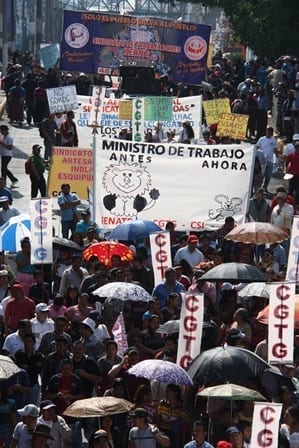
Workers rally for justice for murdered trade unionists during May Day events in Guatemala City. Credit: Stephen Wishart
Worker rights groups are urging the Guatemalan government to bring justice to the families of the more than 56 trade union leaders killed in the past three years. No one has ever been convicted in Guatemala for killing a union leader.
The Trade Union Confederation of the Americas (TUCA) has written to President Otto Perez Molina asking for action to resolve the murders of union leaders and for a commitment to guarantee the right to freedom of association and collective bargaining. TUCA, the regional structure of the International Trade Union Confederation (ITUC), represents more than 50 million workers.
In the letter, TUCA states the murders and the numerous acts of torture, kidnappings, raids and death threats have created a culture of fear and violence throughout the country accompanied by an unrelenting series of violations of freedom of association and the right to collective bargaining.
TUCA also writes that the global trade union movement was surprised by the 2013 Report by the International Labor Organization Committee of Experts which cited the government’s progress in resolving numerous cases.
“While progress was reported in these cases, the report fails to share information on concrete results or sentences in a single case. Of most concern is that of the 58 killings admitted by the government over the last six years, only in two cases has the government declared trade union activities as the motive. The other deaths are included among the so-called common crimes such as ‘extortion,’ ‘personal differences’ or ‘crimes of passion.’”
Over the past 20 years, the international community has appealed to the Guatemalan government to address serious human rights violations, to little effect. In addition, Guatemalan unions have sent detailed recommendations for improved labor rights compliance to its government, filed under the Dominican Republic-Central American Free Trade Agreement (DR-CAFTA) complaint process. In 2008, six Guatemalan trade unions filed a complaint about the suppression of worker rights under the trade agreement. The case advanced to the dispute resolution phase in 2011 and is still pending.
TUCA writes that the Rios Montt verdict, “achieved through a profound mobilization of Guatemalan civil society, must now be consolidated, and extended to all sectors of society who suffer the weight decades of violence and impunity. The labor movement, in particular, continues to be one of the main targets of this repression.”
